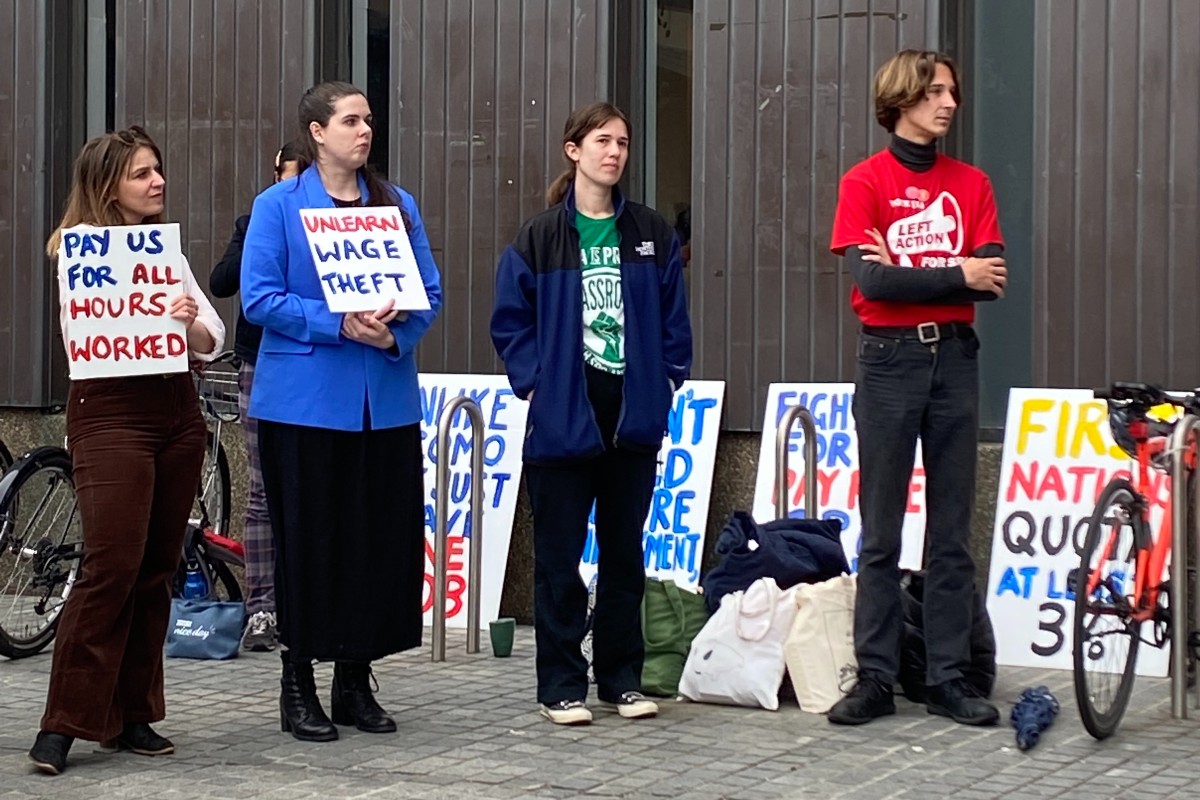
Sydney University students and staff demand an end to casualisation

Image: Sydney University staff and students protesting casualisation and wage theft. Photo: Christine Lai.
By CHRISTINE LAI
Staff and student activists at the University of Sydney (USyd) are protesting against the casualisation crisis and calling for an end to the exploitation of casual academics. Casualised staff currently make up 52% of the workforce at USyd.
The protesters gathered this week to demand backpay for stolen wages, conversion rights, and the end to wage theft in the higher public education sector.
The rally was co-hosted by the USyd Casuals Network and the USyd Education Action Group, and was endorsed by the USyd NTEU branch. Education Officers Deaglan Godwin and Lia Perkins co-chaired the rally.
Last year, the University of Sydney recorded a profit of $1.05 billion while facing accusations of wage theft for over $60 million within the Faculty of Arts and Social Sciences.
Casuals Network activist Lucy Nicolls condemned the systematic underpayment of casuals by the university, while the billion-dollar surplus that management had “pocketed” left many casuals “struggling to make ends meet”.

As a casual academic who has worked in the Department of philosophy for over six years, Nicolls declared that the university currently owed her more than $50 000 in stolen wages.
“This year I had to fight to be rehired for a job that I have successfully performed for over six years, and I’m just one of many who work and experience wage theft and exploitation here every day.
There are thousands of casuals at this university who are working jobs that are casual in name alone. Teaching the same courses, semester after semester, year after year, performing the same essential work that allows the university to function everyday”, Nicolls said.
In October last year, the Faculty of Arts and Social Sciences (FASS) submitted underpayment claims on behalf of 80 casual academics to the demanding backpay for six years of work that totalled over $2 million.
“We work the same jobs year after year, but we’re denied conversion to permanency, we’re denied pay for all the hours of work we perform at the university, sick pay, equal superannuation and in the period where the cost-of-living is skyrocketing, we’re denied a real pay rise at CPI+2.5%,” Nicolls said.

Wendy, another casual tutor in the department of Philosophy, condemned the piece-meal rate that the university employs to determine the pay of casual academics.
She stated that the hours that casuals are paid for was not reflective of the time spent working where “we spend endless hours preparing lectures, tutorials, answering student emails, admin work, marking and providing feedback because we care about the quality of student’s education”.
“We do not get paid for any additional work beyond the hours of work that we are assigned, and management are uninterested in seriously improving our casual conversion clauses”, Wendy said.
Over 4000 casuals were refused conversion last year through pro forma rejection emails sent by the University after an amendment to the Fair Work Act required employees to offer conversion to staff who: have been employed for a period of 12 months and, during the last six months had worked a regular pattern of hours on an ongoing basis.
However, some casual staff who were told they were ineligible for conversion to permanent employment had taught regular courses across several years which led some to question the conditions that were needed to ensure staff could access secure employment.
Cost of living crisis worsens situation
USyd Education Action Group (EAG) activist Ella Haid compared the “ruthlessness of university management” to the profits taken by companies amidst the cost-of-living crisis, where the price of vegetables had gone up by 12 per cent and pasta had gone up by at least 30 per cent.
Haid declared a class war which had “spilled onto campus”, where the share of “wealth going to profits instead of wages” had been further “entrenched by USyd management”.
“We have people whose entire job is to increase the profitability of this university, to cut costs like jobs, courses and our education conditions,” Haid said.
She spoke of the exploitation at Macquarie University which currently has the worst student-to-staff ratio across Australia. Austerity measures and cuts under management have led remaining staff at Macquarie to apply for reduced job opportunities, take voluntary redundancies as a cost-cutting measure for the university.

USyd National Tertiary Education Union (NTEU) Branch President Nick Riemer declared a need to “close the open wound of casualisation at the university”, which was a priority during the NTEU’s bargaining round.
“Casualisation is an issue for the integrity of the university which is something that our members care much more about than the highly paid millionaire executives who devise one new way after another to persecute staff”, Riemer said.
Riemer declared a need to make the argument to management about ending wage theft, acquiring backpay for casuals and the creation of “real proper jobs to replace the casual work that is currently done”, and criticised the university’s failure to address the systemic casualisation crisis during the bargaining campaign.
“We continually find ourselves confronted with these hollow phrases about the need the university has to preserve this thing called excellence as though it can be excellent to have serious academic work done by people who can’t even afford rent and sustenance in any reliable way.”









